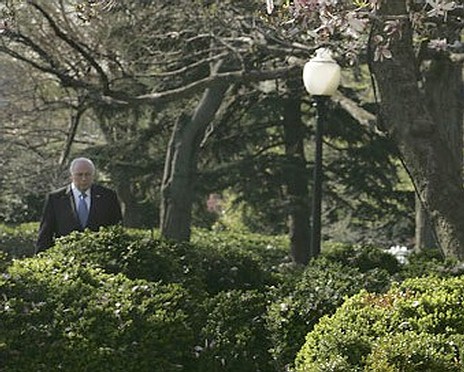weblog | newquaker.com
| notebook weblog | newquaker.com |
© Merle Harton, Jr. | About | XML/RSS Saturday, September 22, 2007
Sell IraqLike a Sufi whirler, things come around again, and again. Back in 2004 I said that the better strategy in Iraq would be to buy the whole country, because in the long run it would be less costly in both dollars and human lives. And it would be the peculiarly American thing to do. Well, this past week the Congressional Budget Office got out its big calculator and came up with a price tag of $25 billion per year for a projected half-century of US military presence in Iraq, if the South Korean model is any guide to how long we can expect to be there.1 1. "Long-term US Iraq bill to be 25 billion dollars: Congress," AFP/Yahoo! News, September 20, 2007. Article is archived at Truthout.org. posted by Merle Harton Jr. | 12:25 AM |Wednesday, September 19, 2007
Oops! They Started It!In a telephone call with Raw Story today and in an article in Salon, foreign-policy strategist Steve Clemons says that President Bush is not going to bomb Iran—unless there should happen to be an "accidental" incident. That would be "accidental" as in pretext, as in the Gulf of Tonkin, the USS Maine, the Lusitania ....  More satire featuring the Cheney-Bush presidency. Labels: Satire posted by Merle Harton Jr. | 12:50 PM |Sunday, September 16, 2007
Godzilla Is USI certainly won't be surprised if Alan Greenspan begins rephrasing his claim that the Iraq war was really for oil. That was the pronouncement today from the most important economist and policy-maker in recent US history. On the other side is the belief that we are in Iraq to save the Middle East from itself. Here's a representative claim from Cox Newspaper columnist Tom Teepen on Friday: The surge has plainly failed by its own lights. It has tamped down violence at least provisionally here and there in Iraq but hasn't, as the rationale for it said it would, inspired Iraq's politicians to stop their endless geeing and hawing and make the essential sectarian and policy compromises. Our own politics are little prettier. It takes two to tango and to craft a common approach. The Democratic congressional leadership, even as it has critiqued the war strongly, has been angling for that, but Bush is having none of it. He is still a true believer and still imagines Iraq as a glittering, humming democracy emerging to bail him out with history. I appreciate Teepen's balance here, but he's been drinking the White House Kool-Aid. At this point in history we don't really know why the US invaded Iraq, because the answer is sitting as a fetid mass on the floor in the conference room with two renowned liars, Bush and Cheney. So we shouldn't listen uncritically when the President says, as he did on Thursday: The success of a free Iraq is critical to the security of the United States. A free Iraq will deny al Qaeda a safe haven. A free Iraq will counter the destructive ambitions of Iran. A free Iraq will marginalize extremists, unleash the talent of its people, and be an anchor of stability in the region. A free Iraq will set an example for people across the Middle East. A free Iraq will be our partner in the fight against terror—and that will make us safer here at home.1 I mean, we can certainly all agree with his conclusions: Whatever political party you belong to, whatever your position on Iraq, we should be able to agree that America has a vital interest in preventing chaos and providing hope in the Middle East. We should be able to agree that we must defeat al Qaeda, counter Iran, help the Afghan government, work for peace in the Holy Land, and strengthen our military so we can prevail in the struggle against terrorists and extremists. But that doesn't mean we should also accept how he gets there.2 That sunny forecast stands in stark contrast to the grim assessment by the White House in a new report to Congress. The Iraqi government has shown satisfactory progress on only 9 of 18 benchmarks, unsatisfactory on 7 while the final 2 were inconclusive, but the White House gave a positive rating on any benchmark where, quote, "present trend data demonstrates a positive trajectory, which is tracking toward satisfactory accomplishment." In other words, thumbs up for a benchmark that might be met eventually.4 In the meantime, we are responsible for 1,220,580 Iraq civilian deaths since the invasion in 2003,5 and this will not be changed by more street protests in Washington, DC.6 Until the US economy shrinks to the point where Americans become inconvenienced by our investment in the Middle East, we will let the Godzilla monster keep roaring and stomping and smashing up other countries. 1. Address by the President to the Nation on the Way Forward in Iraq, September 13, 2007. |
|
|||||||||||||||||||||||
|
|
||||||||||||||||||||||||